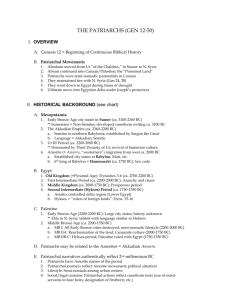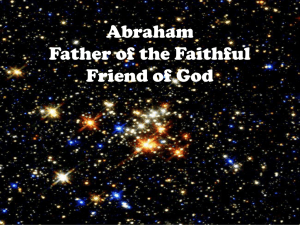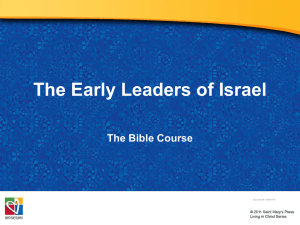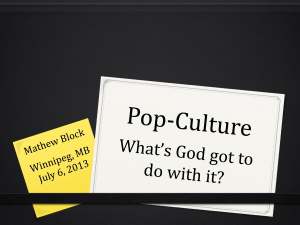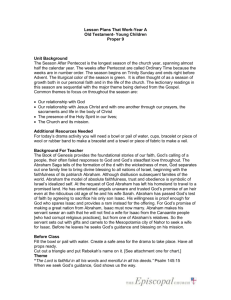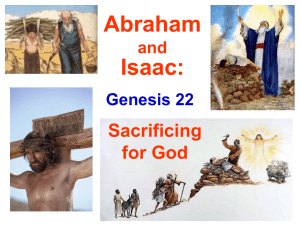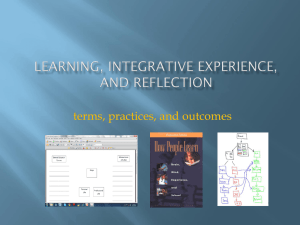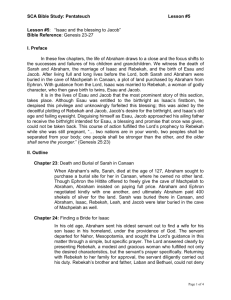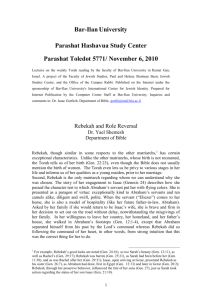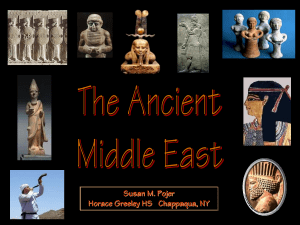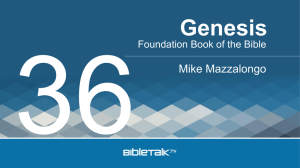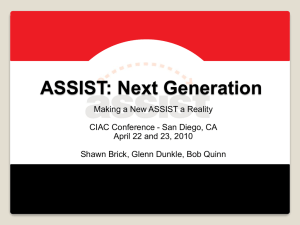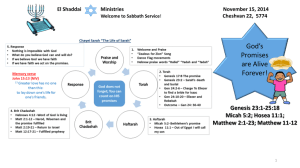Chapter 24 PP slides
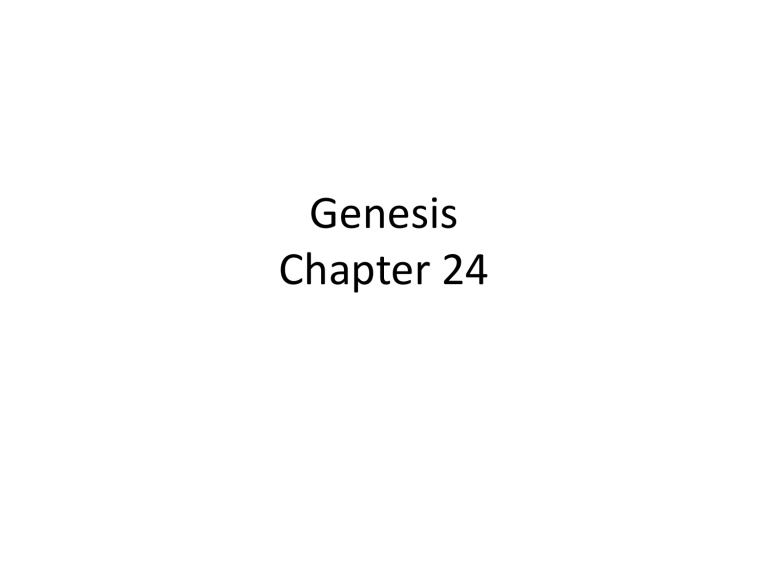
Genesis
Chapter 24
1
• In CH 22 we learned a lot about the faith of
Abraham (Heb 11:17 also). We saw an episode representative of the atonement of Jesus
Christ.
• In this chapter we will see how Rebekah is representative of the church and how the servant is representative of the Holy Spirit in bringing Christians finally to the actual presence of our Lord Jesus Christ.
2: Gen 24: 1-9
• This is the longest chapter in Genesis and the longest account of a single episode outside of the flood. There are two main points:
• The first point is that Isaac’s wife is not to be taken from the Canaanites who are considered cursed: Gen 9:25-27. This new wife would be the mother of a multitude of nations promised by
God from Abraham’s seed. Thus it was imperative that this woman not be a Canaanite.
• The second point is that the descendants of
Abraham are not to return to Abraham’s homeland for their home is now the Promised
Land.
3: Gen 24: 1-9 Again
• Abraham is ~ 140 years old. The servant may be Eliezer (Gen 15:2) but 50-60 years have passed and this may be someone else.
• Background and reasoning behind this oath are unknown. Also mentioned in Gen 47:29.
Similar methods of oaths reported in Australia and Arabia but no historical data available to properly understand it. Could be related to circumcision separating the Jews or that the thigh is the seat of vital functions.
• Faith of Abraham seen again. Land of promise must be preserved.
4: Gen 24:10-27
• Abraham wealthy man although owned no land. Had caravan of 10 camels, people, and gifts. Destination Mesopotamia (between rivers). Gen 25:20 gives destination as Paddanaram, place of Bethuel the Aramean, a Syrian.
In northern Mesopotamia near Haran.
Abraham from Ur in southern Mesopotamia.
Scholars think Nahor was Haran. (Gen 27:43;
28:10; 29:4).
• Path uncertain but maybe reverse of that taken by Abraham (green path is path back to
Abraham).
5
6
7: Gen 24:10-27 Again
• Time of arrival perfect for purpose. Asked God to arrange responses. Verse 12 is first recorded prayer except for Abraham’s intervention for
Sodom. Must have learned to pray from
Abraham. Standard kindness to offer water to stranger but not to water all camels. Servant waited and watched. Camel could drink 20 gallons of water after a long trip and if her container held one gallon she would have made
200 trips! Narrative unusual in that suspense is removed. Abraham is her great uncle and Nahor is her grandfather so she is of the family. She is beautiful and a virgin. Servant gives her gifts and then prays in gratitude to God.
8: Gen 24:28-49
• Rebekah told her mother’s household what happened. Custom would be to say father’s household. Know father alive (verse 50). Possible to interpret Hebrew as grandmother rather than mother. If grandfather died then house belong to grandmother, Milcah. Then such is not unusual and fits with text. I grew up in a similar arrangement.
• Laban, Rachael’s father, saw presents and was impressed. Servant recants entire episode with central points repeated. Tells miraculous birth of
Isaac and that he will inherit all from Abraham and says that the angel will allow for success.
Sovereign acts of God emphasized. Asks that they reply now.
9: Gen 24:50-60
• Laban and Bethuel understand. Unusual for
Laban’s name first. But in household with more than one wife one has possibility of half brothers and half sister. Custom then that full brother of younger sister assumed responsibility and supervision of sister.
Decision then made by full brother and father in that order. They agree that the Lord arranged the meeting and they cannot rule against God.
10: Gen 24:50-60 again
• three witnesses that the events are by the Lord: the narrator (15-16), the servant (26-27), and
Laban (50). Jewish custom required 2-3 witnesses. The final witness is Rebekah as we are told that even against the wishes of her brother and mother she wants to return to Isaac. Her simple response gives insight into her trust of the
Lord in this great change in her life. She is now willing to leave the area of Abraham’s homeland to go to a new land given to Abraham for his descendants. Possess the gate means to conquer the government of the oppressors. Note the comparison with the blessing given Rebekah by her family to that given to Abraham by the Lord:
Gen 22:17.
11: Gen 24:61-67
• No suspense in narrative again. Rebekah quickly dismounted camel for it would be improper for her to be above Isaac. Covered with veil (over all body) for improper for Isaac to see her face until after marriage. Tender statement that Isaac still sad about his mother’s death. part of the Eastern custom for him to bring his wife into the tent of his mother as part of the consummation of a marriage. Isaac was 40 years old at his marriage.
• Abraham is not mentioned in the text but surely he was told of the successful venture and welcomed Rebekah into the family.
12: Gen 24:61-67 again
• Isaac representative of Christ as He awaits the union with His bride, the church. Jesus is preparing a place for her (John 14:3). Rebekah represents church and she is chosen before she knows her bridegroom. Christians chosen before foundation of world (Eph 1:4). Servant represents
Holy Spirit as He prepares Christians throughout life for the meeting with Christ. Church is to be pure (2 Cor 11:2) and being prepared to meet bridegroom (John 3:29). Church will be educated while living to be joined to Him (Rom 7:4). One day we will meet Jesus as the pure church (Eph
5:27).
13: Gen 24:61-67 again
• Rebekah journeyed through the wilderness to meet him as she was guided by the servant and the church has a similar path:1Peter 1:3-9.
• At the end of this narrative we see Isaac for the first time as he goes to meet his bride and similarly Jesus, at the end of this age, will come to meet His bride: 1Thess 4:16-17
• This was a joyous meeting between Isaac and
Rebekah and so will be the final day when all the church is joined with Christ forever.
